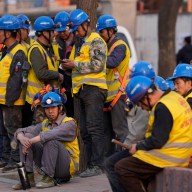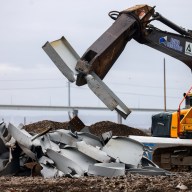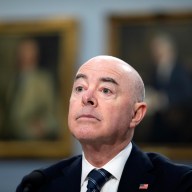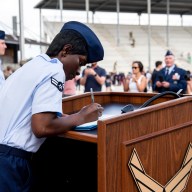BEIJING – Crisis. Disarray. Sadness.
Four months before the opening of what was supposed to be the grandest Olympics in history, the head of the International Olympic Committee is using words that convey anything but a sense of joyous enthusiasm.
The protest-marred Olympic torch relay and international criticism of China’s policies on Tibet, Darfur and human rights have turned the Beijing Games into one of the most politically charged in recent history.
It presented the IOC with one of its toughest tests since the boycott era of the 1970s and ’80s.
“It is a crisis, there is no doubt about that,” IOC President Jacques Rogge said Thursday. “But the IOC has weathered many bigger storms.”
At the same time, Rogge called on China to respect its “moral engagement” to improve human rights and to fulfil promises of greater media freedom. He also reaffirmed the right of free speech for athletes at the Beijing Games.
Rogge spoke in Beijing just hours after the completion of the torch relay in San Francisco, where the route was shortened and the flame diverted to prevent disruptions by massive crowds of anti-China protesters.
Rogge’s use of the word “crisis” to describe the torch relay and the Beijing buildup came as a surprise. The Belgian orthopedic surgeon’s comments usually are measured and low-key.
He cited previous crises – the attack on Israeli athletes at the 1972 Munich Olympics and the boycotts of the 1976, 1980 and 1984 Games.
“The history of the Olympic Games is fraught by a lot of challenges,” Rogge said. “This is a challenge but you cannot compare to what we had in the past.”
British IOC member Craig Reedie believes the worst is over.
“I hope that we are through it now,” he said.
“I think the furor that has affected the torch in London, Paris and to some extent in San Francisco will now die down. … But it is fair to say that this kind of political protest is a new experience for the IOC and we have all found it extremely uncomfortable.”
After the chaos caused by pro-Tibet demonstrators during torch relays in London and Paris, IOC officials were relieved the North American leg passed without any injuries.
“Fortunately, the situation was better in San Francisco,” Rogge said. “It was, however, not the joyous party that we had wished it to be.”
“Athletes in many countries are in disarray and we need to reassure them,” he added. “Our major responsibility is to offer them the games they deserve. … We have 120 days to achieve this.”
Earlier in the week, IOC officials had contemplated possibly cutting short the international leg of the relay, but Rogge said Thursday that was not an option.
“This scenario is definitely not on the agenda,” he said. “We are studying together with (Beijing organizers) to improve the torch relay, but there is no scenario of either interrupting or bringing (the torch) back directly to Beijing.”
But local officials might still shorten existing routes if security demands it.
Already, the head of the committee organizing the torch run in Indonesia said the route will be significantly shortened because of Chinese concerns it might attract pro-Tibet protests.
The relay, scheduled for April 22, was originally planned to follow a 16-kilometre course in Jakarta, but now it will only travel in the vicinity of the city’s main sports stadium, said Sumohadi Marsis, the head of the organizing committee.
Hong Kong Chief Secretary for Administration Henry Tang said officials many tweak the torch relay route to ensure order when the flame arrives April 30. He said 3,000 police will be deployed.
The flame will be carried through Buenos Aires, Argentina, on Friday, with a dozen other countries still to come.
The relay also is expected to face demonstrations in New Delhi, India, which has a substantial Tibetan population, and possibly elsewhere on its 21-stop tour before arriving in mainland China on May 4. The Olympics begin Aug. 8.
Rogge said he had assurances from Beijing organizers that all measures were being taken to ensure the torch’s “safe passage.”
The future of international torch relays is in serious doubt, however. Rogge said “all options are open” for future games, including restricting the relays to the territory of the host country, a policy favoured by a large number of IOC members. Athens, in 2004, was the first host city to organize a global relay.
Rogge said the issue would be reviewed later in the year – “not in the heat of this week’s events.”
Rogge was asked whether he had second thoughts about awarding the games to Beijing seven years ago.
“I’ve said that it is very easy with hindsight to criticize the decision,” he said. “It’s easy to say now that this was not a wise and a sound decision.”
But Rogge insisted Beijing had “clearly the best bid” and offered the strong pull of taking the Olympics to a country with one-fifth of the world’s population.
When Beijing was seeking the games, Rogge noted, Chinese officials said the Olympics would help advance social change, including human rights. He called that a “moral engagement” and stressed there was no “contractual promise whatsoever” on human rights in the official host city contract.
“I would definitely ask China to respect this moral engagement,” Rogge said.
A Chinese Foreign Ministry spokeswoman responded that IOC officials support adhering to the Olympic Charter and “not bringing any irrelevant political factors into the Beijing Olympics.”
Rogge reported having “very frank and open discussions” with Chinese Premier Wen Jiabao on Wednesday. He declined to elaborate.
Rogge insisted that “a number of important points have been met” on human rights, including a new Chinese law enacted in 2007 that removed many restrictions on foreign journalists. But he said the law had not been fully implemented and he was urging Chinese officials to do so “as soon as possible.”
Rogge refused to be drawn on the prospect of top world leaders snubbing the Beijing opening ceremony.
“Politicians have to make their decisions themselves,” Rogge said. “The IOC will not intervene in this matter.”
British Prime Minister Gordon Brown and German Chancellor Angela Merkel will not be attending the opening, and French President Nicolas Sarkozy is considering staying away. U.S. Democratic presidential candidates Barack Obama and Hillary Rodham Clinton have called on President George W. Bush to boycott the ceremony.














